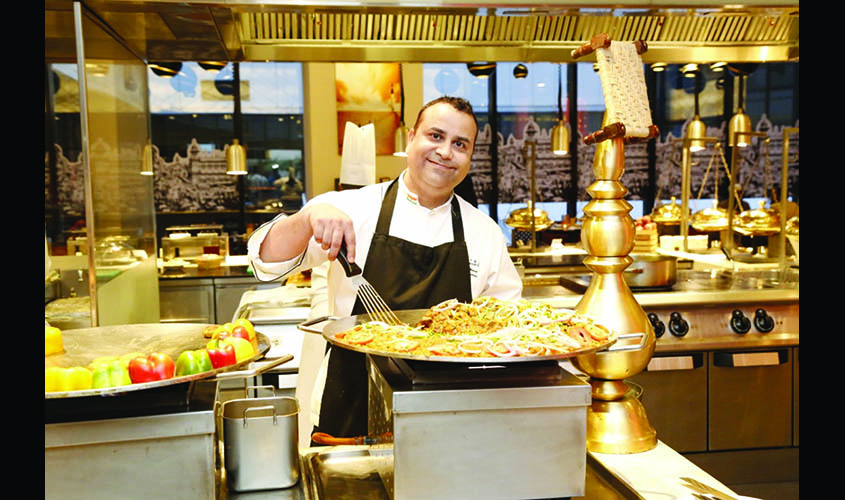Food Exchange at Novotel, Aerocity, is hosting the Mohammad Ali Road Food Festival, which started on 2 August and ends today. It is themed on the famous Mumbai lane, called the Mohammad Ali Road, known for its street food delicacies, like kebabs, shawarmas, sherbet and phirnis etc. Among veteran foodies, the lane is also known as the “Khau Gully”, or Foodie Street.
Biswajit Chakraborty, General Manager of Novotel, Aerocity, came up with the idea for the festival. Aiming to offer a different kind of gastronomic treat to street-food lovers in Delhi, Chakraborty decided to curate an event around Mumbai’s best known food street, drawing inspiration straight from the prominent kitchens of the Mohammad Ali Road.
The ten-day food festival is following a menu that features ten different dishes served each day.
Chef Shadab Ahmad from Sofitel Mumbai BKC, a maestro of this cuisine, was roped in to craft the menu. He said, “The street does not sleep during the month of Ramzan. It is one of the famous iftaar havens for Mumbaikars.”

According to Chef Ahmad, Mohammad Ali Road is very similar to the busy lanes of Jama Masjid in Old Delhi, whose kebabs and phirnis are famous around the world.
So what makes the food of Mohammad Ali Road unique? The answer lies in the fact that almost all of these dishes are prepared on a tawa, a disc-shaped frying pan. Chef Ahmad explained, “From the cutlets to the rice and vegetables, everything is heated on the tawa once before serving.” Tawa Keema is one of the most famous dishes from the road.
The delicacies served at this festival included Gurda Kaleji Keema, Nalli Nihari, Chicken Biryani and much more.
Since seafood is preferred over other meats in Mumbai, prawns and fishe dominate the street-food menu. Such was the case at the Delhi festival, too.
While the street-food cultures of both these cities are similarly vibrant, there’s a difference between the domninant flavours in Delhi and Mumbai cuisines.
Highlighting the differences between the dishes of northern and central India, Chef Ahmad said, “Northern flavours are much more aromatic and simple, while southern dishes have a variety of spices in them.”
The festival menu has been curated keeping this distinction in mind. Also, it aims to cater to a variety of food lovers, including vegetarians. An equal number of vegetarian and non-vegetarian dishes feature on the menu.

A personal favourite of Chef Ahmad, Batel Tawa Masala is among the highlights of this menu. The preparation is simple: marinate a quail with tawa masala and roast it in a tandoor with a set of varied spices, like cashews, onion powder and more, which are heated on the tawa together. In preparing all these dishes, the chefs have used a range of authentic spices, like Marathi Monkh from Mumbai.
The dessert section here offers all the specialties of Mohammad Ali Road—Sewaiyan or Sheer Khurma along with Faluda Kulfi.
Speaking to us about his practice, Chef Ahmad also had a point to make about biryani. He told us that it is not the correct name of the dish. It was historically Brinj Bariyaan, which means sautéd rice with cooked meat in Persian. But over time, people began to mispronounce the name as biryani. “Every place has a different biryani, from Awadhi Biryani to Hyderabadi, there is a different one at every place, and Mumbai does not have a biryani of its own.”
In addition to the exotic menu, the entire décor was inspired by the streets of Mumbai. The venue has been decked up with lights and candles, not unlike a busy and illumined Mohammad Ali Road on the eve of Eid.
The waiters and chefs are dressed in kurta–pajamas and don scarfs. Instead of the soulless muzak one is used to hearing at fine-dining venues, resonating here were sounds of qawalli, in accordance with the overall theme.
Right from the entrance, where Gulab Sharbat is served, to the point of exit, with the Falooda Kulfi corner beside it, the festival recreates the vibe of the Mohammad Ali Road, and it’s worth visiting just for that experience.

